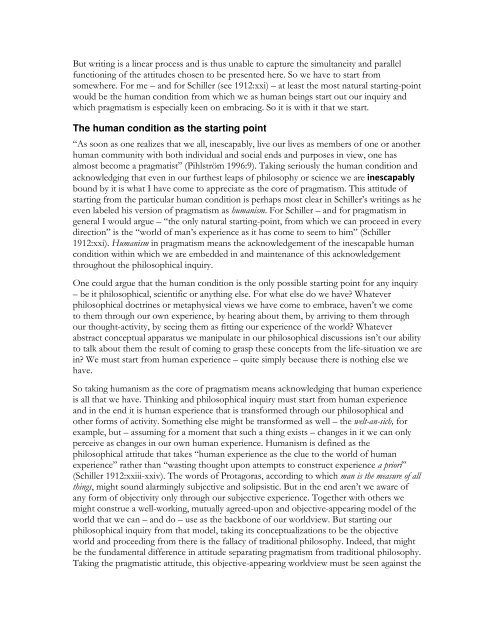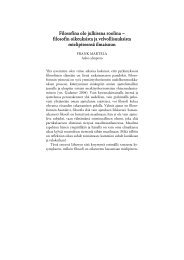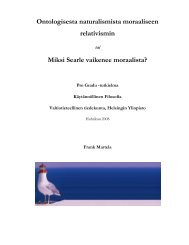Pragmatism as an attitude - Frank Martela
Pragmatism as an attitude - Frank Martela
Pragmatism as an attitude - Frank Martela
Create successful ePaper yourself
Turn your PDF publications into a flip-book with our unique Google optimized e-Paper software.
But writing is a linear process <strong>an</strong>d is thus unable to capture the simult<strong>an</strong>eity <strong>an</strong>d parallel<br />
functioning of the <strong>attitude</strong>s chosen to be presented here. So we have to start from<br />
somewhere. For me – <strong>an</strong>d for Schiller (see 1912:xxi) – at le<strong>as</strong>t the most natural starting-point<br />
would be the hum<strong>an</strong> condition from which we <strong>as</strong> hum<strong>an</strong> beings start out our inquiry <strong>an</strong>d<br />
which pragmatism is especially keen on embracing. So it is with it that we start.<br />
The hum<strong>an</strong> condition <strong>as</strong> the starting point<br />
“As soon <strong>as</strong> one realizes that we all, inescapably, live our lives <strong>as</strong> members of one or <strong>an</strong>other<br />
hum<strong>an</strong> community with both individual <strong>an</strong>d social ends <strong>an</strong>d purposes in view, one h<strong>as</strong><br />
almost become a pragmatist” (Pihlström 1996:9). Taking seriously the hum<strong>an</strong> condition <strong>an</strong>d<br />
acknowledging that even in our furthest leaps of philosophy or science we are inescapably<br />
bound by it is what I have come to appreciate <strong>as</strong> the core of pragmatism. This <strong>attitude</strong> of<br />
starting from the particular hum<strong>an</strong> condition is perhaps most clear in Schiller’s writings <strong>as</strong> he<br />
even labeled his version of pragmatism <strong>as</strong> hum<strong>an</strong>ism. For Schiller – <strong>an</strong>d for pragmatism in<br />
general I would argue – “the only natural starting-point, from which we c<strong>an</strong> proceed in every<br />
direction” is the “world of m<strong>an</strong>’s experience <strong>as</strong> it h<strong>as</strong> come to seem to him” (Schiller<br />
1912:xxi). Hum<strong>an</strong>ism in pragmatism me<strong>an</strong>s the acknowledgement of the inescapable hum<strong>an</strong><br />
condition within which we are embedded in <strong>an</strong>d mainten<strong>an</strong>ce of this acknowledgement<br />
throughout the philosophical inquiry.<br />
One could argue that the hum<strong>an</strong> condition is the only possible starting point for <strong>an</strong>y inquiry<br />
– be it philosophical, scientific or <strong>an</strong>ything else. For what else do we have? Whatever<br />
philosophical doctrines or metaphysical views we have come to embrace, haven’t we come<br />
to them through our own experience, by hearing about them, by arriving to them through<br />
our thought-activity, by seeing them <strong>as</strong> fitting our experience of the world? Whatever<br />
abstract conceptual apparatus we m<strong>an</strong>ipulate in our philosophical discussions isn’t our ability<br />
to talk about them the result of coming to gr<strong>as</strong>p these concepts from the life-situation we are<br />
in? We must start from hum<strong>an</strong> experience – quite simply because there is nothing else we<br />
have.<br />
So taking hum<strong>an</strong>ism <strong>as</strong> the core of pragmatism me<strong>an</strong>s acknowledging that hum<strong>an</strong> experience<br />
is all that we have. Thinking <strong>an</strong>d philosophical inquiry must start from hum<strong>an</strong> experience<br />
<strong>an</strong>d in the end it is hum<strong>an</strong> experience that is tr<strong>an</strong>sformed through our philosophical <strong>an</strong>d<br />
other forms of activity. Something else might be tr<strong>an</strong>sformed <strong>as</strong> well – the welt-<strong>an</strong>-sich, for<br />
example, but – <strong>as</strong>suming for a moment that such a thing exists – ch<strong>an</strong>ges in it we c<strong>an</strong> only<br />
perceive <strong>as</strong> ch<strong>an</strong>ges in our own hum<strong>an</strong> experience. Hum<strong>an</strong>ism is defined <strong>as</strong> the<br />
philosophical <strong>attitude</strong> that takes “hum<strong>an</strong> experience <strong>as</strong> the clue to the world of hum<strong>an</strong><br />
experience” rather th<strong>an</strong> “w<strong>as</strong>ting thought upon attempts to construct experience a priori”<br />
(Schiller 1912:xxiii-xxiv). The words of Protagor<strong>as</strong>, according to which m<strong>an</strong> is the me<strong>as</strong>ure of all<br />
things, might sound alarmingly subjective <strong>an</strong>d solipsistic. But in the end aren’t we aware of<br />
<strong>an</strong>y form of objectivity only through our subjective experience. Together with others we<br />
might construe a well-working, mutually agreed-upon <strong>an</strong>d objective-appearing model of the<br />
world that we c<strong>an</strong> – <strong>an</strong>d do – use <strong>as</strong> the backbone of our worldview. But starting our<br />
philosophical inquiry from that model, taking its conceptualizations to be the objective<br />
world <strong>an</strong>d proceeding from there is the fallacy of traditional philosophy. Indeed, that might<br />
be the fundamental difference in <strong>attitude</strong> separating pragmatism from traditional philosophy.<br />
Taking the pragmatistic <strong>attitude</strong>, this objective-appearing worldview must be seen against the






